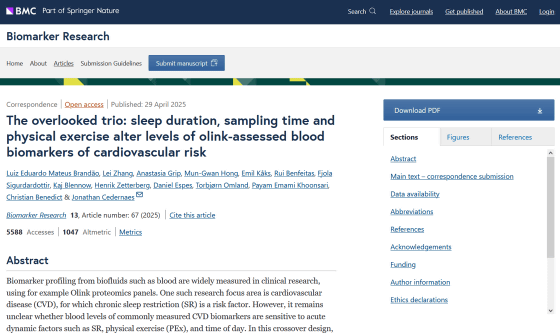Just three consecutive days of lack of sleep could be damaging to your heart

In recent years, it has become widely known that lack of sleep is bad for your health, but you may be tempted to cut down on your sleep, thinking that it's okay for a few days. A research team from
The overlooked trio: sleep duration, sampling time and physical exercise alter levels of olink-assessed blood biomarkers of cardiovascular risk | Biomarker Research | Full Text
https://biomarkerres.biomedcentral.com/articles/10.1186/s40364-025-00776-0

Just three nights of poor sleep might harm your heart – new study
https://theconversation.com/just-three-nights-of-poor-sleep-might-harm-your-heart-new-study-256534
Researchers use various biomarkers in blood and other tissues to measure the risk of heart disease and other conditions. Inflammatory proteins are one such biomarker, and they are secreted when the body is under stress or fighting disease. If inflammatory proteins remain high for a long period of time, they can damage blood vessels and increase the risk of cardiovascular diseases such as heart failure, coronary artery disease, and arrhythmia.
Lack of sleep is known to be a risk factor for cardiovascular disease, but it was unclear how commonly measured levels of inflammatory proteins in the blood are affected by sleep deprivation, physical exercise, etc.
The research team recruited 16 healthy men of normal weight to follow either a 8.5 hour sleep pattern for three days in a row or a 4.25 hour sleep pattern for three days in a row. Blood samples were taken from the subjects in the morning and evening, and after the three-day experiment, they were asked to ride an exercise bike for 30 minutes, and blood samples were taken before and after the exercise.

Analysis of around 90 proteins in the blood samples revealed that just three days of sleep deprivation significantly increased the levels of inflammatory proteins associated with cardiovascular disease.
In addition, exercise generally increases proteins that support brain and heart health, such as
Furthermore, blood protein concentrations fluctuated significantly between morning and night, and the difference was more pronounced when people were sleep deprived. These results suggest that sleep not only affects the components in the blood, but also the timing of these changes.

'Surprisingly, these changes occurred in young, healthy adults after just a few days of insomnia. This is concerning as it is common for adults to experience occasional insomnia and around one in four people work shift work which disrupts their sleep rhythms,' said Associate Professor Annie Curtis from the Royal College of Surgeons in Ireland, who was not involved in the study.
in Science, Posted by log1h_ik